Edie Melson's Blog, page 212
January 27, 2020
Focus While You Write
by Larry Leech @LarryJLeechII
Focus can be one of the most … Did you just see that? That gray BMW almost rear-ended the car in the drive thru at Starbucks. That would have been a heckuva way to start the day.
Focus. Focus. Focus.
Sometimes that one word can be as elusive as a running back slipping through a hole en route to a long touchdown run.
Focus While You Write @LarryJLeechII on @BRMCWC
Oh, yea. The Super Bowl is next week. I’m rooting for the Forty-Niners. Well, they are my favorite team, although I grew up in the Pittsburgh, Pa. area.
Back to focus. For as long as my mind can stay on topic. For the moment, that’s writing this blog. Limiting distractions as a freelancer is something I had to learn when I left the corporate world more than 15 years ago. I struggled at first, and at times, I still do, but my mantra now is “If I don’t work, I don’t get paid.” Getting paid can be a great motivator.
Staying focused is important, even if you aren’t getting paid. I learned a few things along the way. Some of them seem simple:
Minimize or close the Internet
Close Outlook so I don’t see the new email notifications
Others haven’t been as simple.
When I work at a nationally known coffee shop, a lot of people came through each hour. Being a people watcher is a hobby of many writers, this one included. I’ve had to force myself to keep my head down and not pay attention to what is going on around me.
Let my home office remain a mess until quitting time each day
Avoid my phone, which I now place face down while working
Other things to consider:
Set a timer to work 55 minutes each hour and then take a 5-minute break
Get up and stretch
Set a timer to pray twice a day during your break
Hang a Do NOT DISTURB sign on your home office when you must stay focused
Eat well (For some, this may mean limiting the amount of sugar or, gasp caffeine.)
Establish a reasonable list each day of things to accomplish AND break each into a smaller task with a deadline
Reward yourself when you make your deadline
Those are just a few things that can help you stay … Oh, look at that pretty butterfly. Isn’t it beautiful? Dang, it just fluttered away.
Focus. What a wonderful thing, when achieved. Productivity increases. Peace replaces anxiety.
Your editor will be happy. Your family will be happy. You will be happy.
And you’ll have plenty of time to watch butterflies because all the work will be done.
[image error]Writing coach of award-winning novelists, Larry J. Leech II has spent nearly 40 years working with words. After a 23-year journalism career that began in 1981, Larry moved into freelance writing and editing in 2004. He has ghostwritten nearly 30 books and edited more than 250 manuscripts. Larry teaches at numerous conferences nationwide and can be found online on Twitter, Facebook, Instagram, and his website, www.larryleech.com.
The post Focus While You Write appeared first on Blue Ridge Mountains Christian Writers Conference.
January 26, 2020
Creating Community with Writers & Readers

by Ane Mulligan @AneMulligan
A few years ago, I took a marketing course at a writers conference. Presented by three multi-published Southern authors, Janice Thompson, Kathleen Y'Barbo, and Anita Higman, the class taught me a lot about marketing. But the one idea that really struck a chord within me was creating a tribe. The people in a writer's tribe are those who love their stories and help promote their work.
Okay, but the conference took place less than two weeks after the release of my debut novel, Chapel Springs Revival, so while I came home with terrific ideas, I wasn't ready to put any in place. I mean, doesn't one actually need fans to have a tribe? When reviews began to come in, I was thrilled. People responded to my whacked sense of humor and my characters. They loved them! I gained a few fans. Amazing. One sent me a photo he made that I've framed. Yes, I basked in its light for a moment.
I decided to go ahead and put into place what I'd learned from the conference. I formed a private Facebook group, naming it after the bakery in my Chapel Springs series, Dee's 'n' Doughs, where everyone gathers in Chapel Springs. I invited those who followed my blog tour and loved the characters. They helped promote my books. For that, they get sneak peeks at the next book in the series, special offers, the chance to help name people, and other special things just for them.
I uploaded a file with the names and roles of the characters in the series. Those who joined Dee's 'n' Doughs took on the persona of one of the characters and they interact as such. They were having a crazy lot of fun. In some of the dialogue between these "characters," I picked up new ideas for another book in the series.
When someone mentioned a new item for the bakery, I got the idea to have everyone submit recipes as their character and put together the Chapel Springs Cookbook and Some added fun side notes to the recipes that came straight from Chapel Springs Revival. My publisher loved it and published it.
Now it’s time for a new marketing idea. I have a new series beginning and the first book releases in August. Here’s my cover. Isn’t it pretty?
So, who has a great idea to share with me for this marketing campaign kickoff?
TWEETABLECreating Community with Writers & Readers - @AneMulligan on @EdieMelson (Click to Tweet)
 Ane Mulligan has been a voracious reader ever since her mom instilled within her a love of reading at age three, escaping into worlds otherwise unknown. But when Ane saw Mary Martin in PETER PAN, she was struck with a fever from which she never recovered—stage fever. She submerged herself in drama through high school and college. Years later, her two loves collided, and a bestselling, award-winning novelist emerged. She resides in Sugar Hill, GA, with her artist husband and a rascally Rottweiler. Find Ane on her website, Amazon Author page, Facebook, Twitter, Instagram, Pinterest and The Write Conversation.
Ane Mulligan has been a voracious reader ever since her mom instilled within her a love of reading at age three, escaping into worlds otherwise unknown. But when Ane saw Mary Martin in PETER PAN, she was struck with a fever from which she never recovered—stage fever. She submerged herself in drama through high school and college. Years later, her two loves collided, and a bestselling, award-winning novelist emerged. She resides in Sugar Hill, GA, with her artist husband and a rascally Rottweiler. Find Ane on her website, Amazon Author page, Facebook, Twitter, Instagram, Pinterest and The Write Conversation. January 25, 2020
Now That’s Alarming

by Rhonda Rhea @RhondaRhea
I keep trying to find a friendly-sounding alarm clock. Do you have one of those alarms that shrieks at the decibel level of a tornado siren? The alarm goes off, you jolt up in a panic, heart pounding, barely catching yourself before you sprint to the nearest storm shelter. Ever find those fingernail marks in the ceiling over your bed? And my alarm doesn’t blast and then stop. No, it just keeps on shrieking. Smashing it with a fist does nothing—except cause major fist pain. Throwing it across the room doesn’t faze it. Stomping on it doesn’t do much either. Maybe you can guess why I never keep a sledgehammer beside my bed. Or C-4.Why don’t they make an alarm clock that gently jostles my shoulder while softly informing me that the cinnamon rolls are ready?
The thing is, if I ever found that kind of pleasant alarm clock, I’m pretty sure it wouldn’t wake me. I guess that means there really is purpose in the shriek.
I’m convinced that there are times I need a soul alarm, too. And not a soft jostle. A good shrieking jolt. In Psalm 57, David sounds the alarm with an “Awake, my soul!”
David says, “My heart is steadfast, O God, my heart is steadfast; I will sing and make music. Awake, my soul! Awake, harp and lyre! I will awaken the dawn. I will praise you, O Lord, among the nations; I will sing of you among the peoples. For great is your love, reaching to the heavens; your faithfulness reaches to the skies. Be exalted, O God, above the heavens; let your glory be over all the earth,” (verses 7-11 ESV).
David is telling his sleepy-head soul to get in gear, loving, serving and glorifying the name of God. He’s waking up that part of him that is built to praise the God of the universe, readying himself for a new day of telling the whole world of the Father’s wonderful love, of His amazing faithfulness and of His vast glory.
Rejoicing in his circumstances? Not so much. David was in a cave, hiding from the king who hated him. He was in danger, running for his life. Sometimes when our circumstances aren’t exactly the best, we need to awaken our souls all the more to understand the goodness of God and to enthusiastically sing praises to the Father from every part of our being. David’s dire circumstances and his unjust treatment screamed an urgency to share the Lord with a lost world, to contrast the wickedness of evildoers with the greatness of God. There was still great purpose in the shriek.
No matter what circumstances we find ourselves in, our heavenly Father’s greatness always, always calls for celebration. Sometimes loud celebration. Sometimes quiet celebration.
And me? Sometimes I like to celebrate with cinnamon rolls.
TWEETABLENow That’s Alarming - @RhondaRhea on @EdieMelson (Click to Tweet)
 Rhonda Rhea is a humor columnist for lots of great magazines, including HomeLife, Leading Hearts, The Pathway and more. She is the author of 10 nonfiction books, including How Many Lightbulbs Does It Take to Change a Person? and coauthors fiction with her daughter, Kaley Faith Rhea. She and her daughters host the TV show, That’s My Mom, for Christian Television Network’s KNLJ. Rhonda enjoys traveling the country speaking at all kinds of conferences and events. She and her pastor/hubs have five grown children and live in the St. Louis area.
Rhonda Rhea is a humor columnist for lots of great magazines, including HomeLife, Leading Hearts, The Pathway and more. She is the author of 10 nonfiction books, including How Many Lightbulbs Does It Take to Change a Person? and coauthors fiction with her daughter, Kaley Faith Rhea. She and her daughters host the TV show, That’s My Mom, for Christian Television Network’s KNLJ. Rhonda enjoys traveling the country speaking at all kinds of conferences and events. She and her pastor/hubs have five grown children and live in the St. Louis area.
10 Reasons to Attend the Blue Ridge Mountains Christian Writers Conference
by DiAnn Mills @DiAnnMills
Now is the time to make plans to attend the Blue Ridge Mountains Christian Writers Conference May 24-28 and the post conference with Jane Friedman on May 29.
We are thrilled at the lineup of experienced faculty who are well-known within the publishing industry as polished professionals. For those who have previously experienced the conference, you know the benefits professionally, personally, mentally, and spiritually. But some may be asking themselves why the need to take part in this event.
10 Reasons to Attend the Blue Ridge Mountains Christian Writers Conference @DiAnnMills on @BRMCWC
Take a look at the following 10 reasons how the Blue Ridge Mountains Christian Writers Conference can benefit your career.
1. Connect with agents, editors, speakers, and freelance writers face-to-face who are interested in guiding writers who want to build their writing career.
2. Discover new areas of writing and more details about the publishing industry.
3. Enter contests and maybe win: Foundation Awards for the pre-published writer, Selah Awards for the published writer, and Directors’ Choice awards for the published writer who has created an outstanding book.
4. Experience the presence of God at the beautiful Ridgecrest Conference Center in the heart of the Blue Ridge Mountains. The spiritual growth is truly a mountaintop adventure.
5. Find encouragement, inspiration, knowledge, and wisdom among like-minded and godly people.
6. Learn the craft of writing according to your genre and level of expertise by the industry’s finest instructors in the publishing world. We offer Act I, II, and III level courses designed to meet writer needs.
7. Move closer to reaching your dreams and goals of publication.
8. Network with other writers who have the potential of becoming lifelong friends, critique partners, and prayer partners.
9. Select from various methods of learning: workshops, practicums, and continuing classes.
10. Zoom in on having fun while being energized to write-on.
The Blue Ridge Mountains Christian Writers Conference is committed to “Changing the world, one writer at a time.”
Are you ready to register?
*photo credit, Edie Melson (taken on site at the Ridgecrest Conference Center)
[image error]DiAnn Mills is a bestselling author who believes her readers should expect an adventure. Her titles have appeared on the CBA and ECPA bestseller lists; won two Christy Awards; and been finalists for the RITA, Daphne Du Maurier, Inspirational Readers’ Choice, and Carol award contests. Firewall, the first book in her Houston: FBI series, was listed by Library Journal as one of the best Christian Fiction books of 2014.
DiAnn is a founding board member of the American Christian Fiction Writers, a member of Advanced Writers and Speakers Association, Suspense Sister, and International Thriller Writers. She is co-director of The Blue Ridge Mountain Christian Writers Conference and The Author Roadmap with social media specialist Edie Melson. She teaches writing workshops around the country.
DiAnn is very active online and would love to connect with readers on Facebook: www.facebook.com/diannmills, Twitter: https://twitter.com/diannmills or any of the social media platforms listed at www.diannmills.com.
The post 10 Reasons to Attend the Blue Ridge Mountains Christian Writers Conference appeared first on Blue Ridge Mountains Christian Writers Conference.
January 24, 2020
One Word At A Time: The Art of Single-Tasking and Writing Your Book
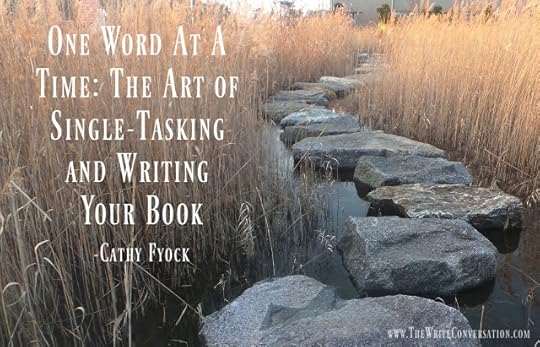
by Cathy Fyock @CathyFyock
Some time ago I spoke at the Greater Cincinnati ATD (Association for Talent Development) Conference and had the chance to attend a session led by Michael Goeke of Priority Management. In his session Michael talked about the myths of multi-tasking and how we actually work more slowly when we switch between one task and another.I got to thinking about how that applied to us as writers, and I came up with these ideas for keeping a single focus while we write so that we can ramp up our productivity (and finish our books!).Don’t mix creative writing with editing. Brain science tells us that writing and editing are two distinct brain functions, and it actually wears us out as we are trying to write and edit simultaneously. Write, write, write! Don’t edit. Don’t stop. Just keep those fingers moving.Develop a very detailed TOC (table of contents), then work only on a tiny segment of the outline at a time. By focusing on very distinct, tiny chunks of writing we can move quickly through the outline and achieve higher productivity in our writing.Keep your files for your book together in one place. You might even need to catalogue your various articles and blogs from which you’ll reference your writing, but having it together in one place will allow you to both repurpose your writing and eliminate time in searching for that article or detail.Clear all distractions. File papers on your desk. Turn off email notification. Hold your calls or turn off your phone. Remember, you can only do one thing well at a time.Work on one chapter at a time so that you can stay focused and get it checked off your list. You’ll feel good about achieving this milestone which will keep you fueled for more successes.When you have an idea that doesn’t go in the piece you are writing, make a quick note of the idea in a central place (perhaps one you’ve designated for such purposes) and let it go. Remember that you need to work on one piece of writing at a time.When you schedule time for writing, write. Don’t conduct interviews, schedule research, or organize your chapters. Writing time is for writing.Set a time each week to plan for your writing. Block off chunks of time, prioritize your writing tasks, and put the specific assignment on your calendar.
Remember, you will become a far more productive writer if you keep a singular focus and forget about multi-tasking. One. Word. At. A. Time.
TWEETABLEOne Word At A Time: The Art of Single-Tasking and Writing Your Book - @CathyFyock on @EdieMelson (Click to Tweet)
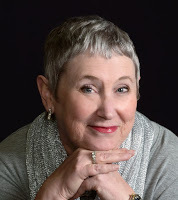 Cathy Fyock is The Business Book Strategist, and works with professionals and thought leaders who want to write as a business development strategy. She is the author of nine books, including her most recent with coauthor Lois Creamer, The Speaker Author: Sell More Books and Book More Speeches. Since starting her business in 2014 she's helped more than 150 professionals become published authors. You can reach her at Cathy@CathyFyock.com.
Cathy Fyock is The Business Book Strategist, and works with professionals and thought leaders who want to write as a business development strategy. She is the author of nine books, including her most recent with coauthor Lois Creamer, The Speaker Author: Sell More Books and Book More Speeches. Since starting her business in 2014 she's helped more than 150 professionals become published authors. You can reach her at Cathy@CathyFyock.com.
Announcing the 2020 Class List for the Blue Ridge Mountains Christian Writers Conference
Below is the link to our 2020 Class offering page. As many of you know, this list will have some changes before we make it to the conference in May. Because of this, we ask that you check back regularly.
2020 Blue Ridge Mountains Christian
Writers Conference Class Listing
The classes are listed in the exact same order as the faculty on the 2020 Faculty Page. We do not add pictures to this page because it makes the size too big to be printed.
Announcing the 2020 Class List for the Blue Ridge Mountains Christian Writers Conference
At the top of the page are 3 icons – a print icon, a PDF download icon and an email icon. These will allow you to print the page so you can have a hard copy.
To make sure we all understand the information, here are the details about the BRMCWC classes.
We offer two main types of classes and ALL class times are 1 hour and 15 minutes long:
Workshop – this is a stand-alone class, with all material presented in one single class time
Continuing class – this class builds on itself, added new material each time it meets. A continuing class can be 2-4 class times in length.
Within these two types of classes, the instructor may choose to make the class a practicum. This would be a class with heavy student participation (for example a class teaching about author bios would become a practicum if the students actually worked on their own bios in class).
We also try to help everyone decide if a class is appropriate to their experience by designating it Act I (beginner) Act II (some experience) Act III (advanced).
This rating is for the class material only, it’s not to designate where an attendee is in their publishing career.
For example, an attendee may have published several devotionals and nonfiction books, so they would be an Act III in those areas, but are just breaking into fiction writing so they are an Act I in the area of fiction. Many classes are designated as covering multiple levels. This is particularly true with social media and some of the business classes. This is why some classes cover multiple levels of experience.
Finally, our schedule—when exactly classes will be taught during the week—will be out in February. So stay tuned to this blog site and will announce when the schedule is live.
The post Announcing the 2020 Class List for the Blue Ridge Mountains Christian Writers Conference appeared first on Blue Ridge Mountains Christian Writers Conference.
January 23, 2020
Use Interval Training to Write More Effectively

By Lori Hatcher @LoriHatcher2
Does your writing life ever feel inefficient, boring, slow, or uninspired?
Welcome to the club.
Sorry, I had to say it.
Unlike glamorous Hollywood portrayals of the writers’ life, reality proves quite different. Even the most profound and prolific writers sometimes struggle to stay motivated, creative, and productive. Today I’d like to share a fitness training approach that has helped me improve the quality of my writing routine. It’s called Interval Training.
What Is Interval Training?I learned about interval training at the fitness center where I exercise. Interval training is training in which an athlete alternates between two activities, typically requiring different rates of speed, degrees of effort, etc.
The Mayo Clinic article, “Rev up your workout with interval training” lists five benefits to this exercise philosophy:Higher calorie burnIncreased time efficiencyAdditional aerobic effectLess boredomIncreased feelings of happiness
Impressed with the science behind this approach, I adopted an interval training exercise routine. I walk five laps at a brisk pace, then jog one. On days when I don’t feel like jogging, I walk rapidly for ten minutes, then stroll for one, walk rapidly, then stroll.
I noticed a difference almost immediately. I finished my workout quicker, which helped me get to work on time. The occasional jog or stroll broke up the monotony of 50 laps around the track, and instead of feeling drained at the end, I felt energized.
Applying Interval Training to Our Writing LifeBolstered by my success, I decided to apply interval training to my writing life, even though it seemed counter-productive to spend precious writing time not writing. My normal approach to a day of writing is quite different—write as fast and furiously as I can, barely stopping to eat, stretch, or go to the bathroom.
Most days, the results are less than desirable. After an hour or two of steady writing, my body begins to protest, my brain grows fuzzy, and my creativity and motivation evaporate like raindrops on hot pavement. My output for the day decreases with every hour I chain myself to my chair, and the quality of my work steadily declines.
When I applied the principles of physical interval training to my writing life, I ordered my day differently. Here’s the schedule I followed:Set a timer for one hour. Begin a new project or continue with one in progress.When the timer rings, get up and move around for 10 minutes.Repeat.
I began with an article assignment. Knowing that my hour was ticking away helped me stay focused, but when the timer rang, I wasn’t finished. During pre-interval training days, I would have pressed on, but that day I stood up and stretched, got a drink of water, and transferred a load of clothes from the washer to the dryer. When the ten minute timer dinged, I went back to work.
I looked back over what I’d written and made some edits. Just a ten minute break gave me the perspective I needed to see mistakes and poor word choices. When I finished editing, I added more content. Although I was in the middle of a paragraph when the next timer rang, I stopped. I walked outside, got the mail and a drink of water, and talked briefly with a neighbor.
At lunch time, I took a thirty-minute break and went for a walk. I didn’t intend to think about writing, but when my walk was over, I’d brainstormed ideas for two blog posts and a conclusion for my article.
When I evaluated the results at the end of the day, I’d accomplished more than I’d planned, still felt energized, and enjoyed that warm feeling of satisfaction I get when I know I’ve spent my day well.
As an added bonus, in my ten minute breaks from writing, I’d washed and dried two loads of laundry and prepped the veggies for dinner.
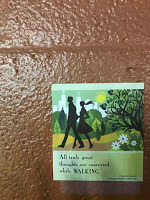 On the wall of the gym, someone (not me) taped a quote by German philosopher Friedrich Nietzsche. It says, “All truly great thoughts are conceived while walking.” I wonder if Nietzsche utilized the principle of interval training in his writing? If so, it worked. And if it worked for him, it might just work for us.
On the wall of the gym, someone (not me) taped a quote by German philosopher Friedrich Nietzsche. It says, “All truly great thoughts are conceived while walking.” I wonder if Nietzsche utilized the principle of interval training in his writing? If so, it worked. And if it worked for him, it might just work for us. Now it’s your turn. Have you ever applied the principles of interval training to your writing time? What were the results? What does a writing day at your home or office look like? I hope you’ll share your thoughts and join the conversation.
TWEETABLEUse Interval Training to Write More Effectively - @LoriHatcher2 on @EdieMelson (Click to Tweet)
 Lori Hatcher is the editor of
Reach Out, Columbia
magazine and the author of several devotional books, including
Hungry for God … Starving for Time, Five-Minute Devotions for Busy Women
, the 2016 Christian Small Publisher Book of the Year. Her most recent book,
Refresh Your Faith – Uncommon Devotions from Every Book of the Bible
releases in the spring of 2020 with Our Daily Bread Publishing. A blogger, writing instructor, and inspirational speaker, Lori’s goal is to help busy women connect with God in the craziness of everyday life. You’ll find her pondering the marvelous and the mundane on her blog, Hungry for God. . . Starving for Time . Connect with her on Facebook, Twitter (@LoriHatcher2), or Pinterest (Hungry for God).
Lori Hatcher is the editor of
Reach Out, Columbia
magazine and the author of several devotional books, including
Hungry for God … Starving for Time, Five-Minute Devotions for Busy Women
, the 2016 Christian Small Publisher Book of the Year. Her most recent book,
Refresh Your Faith – Uncommon Devotions from Every Book of the Bible
releases in the spring of 2020 with Our Daily Bread Publishing. A blogger, writing instructor, and inspirational speaker, Lori’s goal is to help busy women connect with God in the craziness of everyday life. You’ll find her pondering the marvelous and the mundane on her blog, Hungry for God. . . Starving for Time . Connect with her on Facebook, Twitter (@LoriHatcher2), or Pinterest (Hungry for God).
January 22, 2020
Traits of a Successful Critique Group

by Henry McLaughlin @RiverBendSagas
I’m sure we’ve all participated in or heard stories about horrible experiences with critique groups. I’ve had a few myself. Unfortunately, I may also have contributed to some of them. To any writers I did this to, I apologize.I’ve been writing seriously for over ten years. During this time, I’ve participated in many critique groups, both on line and in person. I’m honored and humbled to serve as a writing coach or mentor over numerous groups over the years.
As I’ve traveled this writing journey I’ve noticed that successful groups have certain character traits that distinguish them from the unsuccessful.
In no particular order they are:
Honesty Members are gently honest in sharing their feedback and comments with each other. No holding back to spare someone’s feelings, yet learning to give feedback sensitively so the person can receive it without self-condemnation. And no personal attacks or attempts to dominate or make everyone write the same. Like workout partners, we help each other develop the thick skin necessary to make it in the writing world. As Proverbs says, we are iron sharpening iron.
Encouragement The group is a place where writers give and receive encouragement and support on the writing journey. The group provides a safe and confidential environment, a place where we share triumphs and rejections, struggles and breakthroughs.
Relationships We build relationships of trust and caring. We move from being group members to writing partners to friends.
Learning We learn the craft through practice and open and honest criticism. We share new insights and knowledge.
Challenging We call for each other to grow as writers. We won’t let talented writers settle for less. We won’t let struggling writers give up.
Consistency We show up on time, fully prepared to participate. We adhere to the established rules of the group and submit to the leadership. We learn the value of being writers who have discipline, who meet deadlines, and who put our butts in our chairs to write.
Safety and Trust Many authors write personal stories. Stories of pain, grief, abuse, addiction. Deeply. At one group recently, an author shared how painful it was to hear someone else read her story. Not because the writing was bad but because the story was so real and alive in her still. She didn’t know if she could continue to write, never mind share it.
We encouraged her that the group was a safe place, a place we can share hurts and pains in life as well as in our writing. I believe, for this person, writing the story is part of her healing. Sharing it in the safety of a writers group will help that healing process. Even if her story is never published, it needs to be written.
What traits have you found that make for a good critique group?
TWEETABLETraits of a Successful Writing Critique Group - Henry McLaughlin, @RiverBendSagas on @EdieMelson (Click to Tweet)
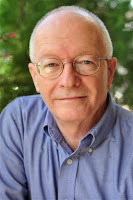 Henry’s debut novel, Journey to Riverbend, won the 2009 Operation First Novel contest.
Henry’s debut novel, Journey to Riverbend, won the 2009 Operation First Novel contest.Henry edits novels, leads critique groups, and teaches at conferences and workshops. He enjoys mentoring and coaching individual writers.
Connect with Henry on his blog, Twitter and Facebook.
January 21, 2020
Writing Quotes that Inspire

by DiAnn Mills @DiAnnMills
Writing quotes inspire, encourage, and can cause us to laugh at ourselves. I’ve been writing for over two decades—novels nonfiction, blog posts, articles, devotions, poetry, short stories, social media posts, and tons of emails. Like you, with every writing project, I’ve learned something new about the craft and myself. Reflections of the process have often led to creating quotes. Step into my private journal for twelve of my favorites.A novel is a living, breathing organism. It has the power to shape and change lives, but a Christian novel does even more. It’s a seed to grow the kingdom of God.If I ever think I’m too big to help another writer, God may think I’m too small for publication.If our calling as writers painfully pushes us to be a layer of artists who excel above the rest, we can pay the price of tears, loss of pride, and look at ourselves in a clearer light. Writers need constructive criticism not empty compliments.If a writer cannot offer hope, what’s the purpose of penning another word?Writing a book takes creativity, stamina, and several pots of dark roasted coffee.Trying is what makes a hero or heroine.A writer looks at the colors of each day and creates a breathless moment.Learning the craft of writing, like any valued skill, is a life-long experience. Embrace it. Crave it. Treasure it.We have a three-fold mission on earth: Love Jesus. Love His people. Show that love. Everything else is simply narration in the big scene of life.Read, write, pray, edit. Repeat.Writing is not a well-oiled machine. It involves our imagination, and that means a constant shot of Writer’s WD40: coffee, chocolate, and creativity.
Here is your challenge. Create a writing quote and share it with us. Be sure to leave your thoughts in the comment section below.
TWEETABLEWriting Quotes that Inspire - @DiAnnMills on @EdieMelson (Click to Tweet)
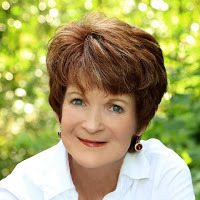 DiAnn Mills is a bestselling author who believes her readers should expect an adventure. She creates action-packed, suspense-filled novels to thrill readers. Her titles have appeared on the CBA and ECPA bestseller lists; won two Christy Awards; and been finalists for the RITA, Daphne Du Maurier, Inspirational Readers’ Choice, and Carol award contests.
DiAnn Mills is a bestselling author who believes her readers should expect an adventure. She creates action-packed, suspense-filled novels to thrill readers. Her titles have appeared on the CBA and ECPA bestseller lists; won two Christy Awards; and been finalists for the RITA, Daphne Du Maurier, Inspirational Readers’ Choice, and Carol award contests. She is the director of the Blue Ridge Mountain Christian Writers Conference, Mountainside Marketing Retreat, and Mountainside Novelist Retreat with social media specialist Edie Melson. Connect here: DiAnnMills.com
January 20, 2020
A New Year Full of New Words

by Lucinda Secrest McDowell @LucindaSMcDowel
Happy New Year! In just a few weeks, my own new book will be released to the world.
Did you think I would be calm with this process by now? The truth – I am in awe. That a fine publisher offered me a contract. That amazing people actually buy the books I write. But mostly, friend, I am in awe that the God of the universe would deign to offer me a part in helping to further His kingdom here on earth.Through words.
And so, I humbly turn to Jesus – the “Word made flesh” who joined us here on earth so that we would always know that He knows – and I pray Thank You.
For this privilege. But also for the hard work accomplished. Because writing is work. It is digging deep for the pearls, sharing vulnerably, sometimes saying hard things, throwing away countless crumpled pages, finding courage to start over, allowing others to critique and cut your story, second-guessing your abilities, and praying over every single word and phrase.
I am convinced God calls each of us to share our unique story in just the manner He equipped us to do it. For me that is in writing and speaking and teaching. I say this with humility, but I also say it with conviction. Because you need to know who you are and who you aren’t in order to fulfill God’s purposes for your life!
My new book – Soul Strong -- will not look like the current bestselling book that you just loved and ordered copies for all your friends. Because I’m not her. I don’t write what she writes or in the same way she writes it. Nor should I. The world already has her. As I began this latest project, I prayed fervently that God would give me insight and my own unique voice to speak into lives.
For writers, writing is an act of obedience to God’s call.
“You are called to a work, and you respond with your particular gifts, vision and energy. You’re rarely sure of what it is you’re about to do, but you have an idea, along with the desire to carry it out. You say yes and then hope that you still will live up to the yes. You feel honored but maybe a bit scared too.” (Vinita Hampton Wright in The Soul Tells a Story)
Today I anticipate my new book in this New Year with great faith and great gratitude. With hope and yes, some humble hesitancy. As I offer seven keys for a vibrant life, I vulnerably reveal a lot of personal life lessons. And that can bring up feelings of insecurity…
What New Thing are you looking forward to this New Year? Is there something important you are hesitant to begin because you feel afraid or unworthy?
I don’t know what God’s call on your life looks like. I don’t know where 2020 will take any of us. But I’m convinced He walks beside each step of the way.
Let’s move forward into the new – writing our best words and leaving the results with the Word Made Flesh.
Happy New Year of Writing from www.LucindaSecrestMcDowell.com
“May our Lord Jesus Christ Himself and God our Father, who has loved us and given us eternal encouragement and good hope by grace, encourage your hearts and strengthen you in every good Work and Word.” 2 Thessalonians 2.16-17
TWEETABLEA New Year Full of New Words - @LucindaSMcDowel on @EdieMelson (Click to Tweet)
 Lucinda Secrest McDowell, M.T.S., is a storyteller and seasoned mentor who engages both heart and mind while
“Helping you Choose a Life of Serenity & Strength.”
A graduate of Gordon-Conwell Theological Seminary and Furman University, McDowell is the author of 15 books and contributing author to 30+ books. Her award-winning books include
LIFE-GIVING CHOICES
,
SOUL STRONG
(2020),
DWELLING PLACES
(2017 Christian Retailing BEST Award for Devotional),
ORDINARY GRACES
(2018 Selah Finalist),
LIVE THESE WORDS
, and
Refresh!
Lucinda, a member of the REDBUD WRITERS GUILD, received Mt. Hermon “Writer of the Year” award and guest blogs for The Write Conversation, Blue Ridge Mountains Christian Writers Conference Blog and (in)courage. Whether co-directing
“RENEW ~ RETREAT FOR NEW ENGLAND WRITING,”
pouring into young mamas, or leading a restorative day of prayer, she is energized by investing in people of all ages. Lucinda’s favorites include tea parties, good books, laughing friends, ancient prayers, country music, cozy quilts, musical theatre, and especially her family scattered around the world doing amazing things. Known for her ability to convey deep truth in practical and winsome ways, she writes from “Sunnyside” cottage in New England and blogs weekly at
https://lucindasecrestmcdowell.com/
Follow Lucinda on Twitter: @LUCINDASMCDOWEL
Lucinda Secrest McDowell, M.T.S., is a storyteller and seasoned mentor who engages both heart and mind while
“Helping you Choose a Life of Serenity & Strength.”
A graduate of Gordon-Conwell Theological Seminary and Furman University, McDowell is the author of 15 books and contributing author to 30+ books. Her award-winning books include
LIFE-GIVING CHOICES
,
SOUL STRONG
(2020),
DWELLING PLACES
(2017 Christian Retailing BEST Award for Devotional),
ORDINARY GRACES
(2018 Selah Finalist),
LIVE THESE WORDS
, and
Refresh!
Lucinda, a member of the REDBUD WRITERS GUILD, received Mt. Hermon “Writer of the Year” award and guest blogs for The Write Conversation, Blue Ridge Mountains Christian Writers Conference Blog and (in)courage. Whether co-directing
“RENEW ~ RETREAT FOR NEW ENGLAND WRITING,”
pouring into young mamas, or leading a restorative day of prayer, she is energized by investing in people of all ages. Lucinda’s favorites include tea parties, good books, laughing friends, ancient prayers, country music, cozy quilts, musical theatre, and especially her family scattered around the world doing amazing things. Known for her ability to convey deep truth in practical and winsome ways, she writes from “Sunnyside” cottage in New England and blogs weekly at
https://lucindasecrestmcdowell.com/
Follow Lucinda on Twitter: @LUCINDASMCDOWEL


